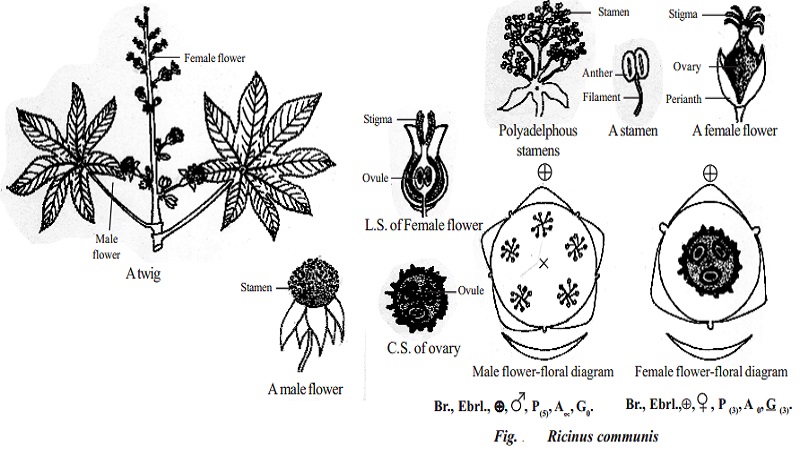Chapter: 11 th 12th std standard Bio Botany plant tree Biology Higher secondary school College Notes
Botanical description and Economic importance of Ricinus communis

Botanical description of Ricinus communis
Habit
Perennial shrub.
Root
Branched tap root system.
Stem
Aerial, erect, herbaceaous but woody below, branched and hollow. Young branches are covered with hair like outgrowth. Latex is present.
Leaf
Petiolate, exstipulate, alternate, deeply palmately lobed with 7 or more lobes. Venation is palmately reticulate divergent.
Inflorescence
Compound raceme or panicle and terminal. Male flowers are seen below and female flowers near the apex.
Male Flower
Bracteate, ebracteolate, pedicellate, actinomorphic and incomplete.
Perianth
Tepals 5, arranged in single whorl, gamophyllous, valvate aestivation and odd tepal is posterior in position.
Androecium
Stamens many, polyadelphous, filaments branched and united to form five branches. Anthers are dithecous, globose, basifixed, introrse and dehiscing by longitudinal slits.
Gynoecium
Absent but pistillode is present.
Floral Formula
Br., Ebrl., x, ![]() , P(5), Ax, G0.
, P(5), Ax, G0.
Female Flower
Bracteate, ebracteolate, pedicellate, actinomorphic, incomplete and hypogynous.
Perianth
Tepals 3 arranged in single whorl and gamophyllous showing valvate aestivation.
Androecium
Absent but staminode is present.
Gynoecium
Ovary superior, tricarpellary and syncarpous. Ovary trilocular with one ovule in each locule on axile placentation. Styles 3, deep red and long. Bifid with feathery stigma.
Fruit
Fruit is called regma. It is covered by spinous outgrowths. The fruit splits into three one seeded cocci.
Seed
Endospermous.
Floral Formula
Br., Ebrl.,x, + , P (3), A 0, G (3).
ECONOMIC IMPORTANCE
1. Food plants
The tuberous root of Manihot esculenta (tapioca) is rich in starch and forms valuable food stuff. The fleshy fruits of Phyllanthus emblica (Gooseberry) are rich in vitamin C. The fruit is edible and pickled.
2. Oil plants
Castor oil extracted from the seeds of Ricinus communis (Castor) is used as lubricant, vegetable oil and purgative. Jatropha oil obtained from the seeds of Jatropha curcas (Kattamanakku) is used as purgative, to treat skin diseases and to extract bio-diesel.
3. Medicinal plants
The entire shoot system of Phyllanthus amarus (Keezhanelli) is used to treat jaundice. The leaves and roots of Jatropha gossypifolia are used in the treatment of leprosy and snakebite.
4. Rubber plants
Over 98% of total natural rubber produced in the world is obtained from the coagulated latex of Hevea brasiliensis (para rubber) and Manihot glaziovii (manicoba rubber).
5. Ornamental plants
Euphorbia pulcherrima, Codiaeum variegatum (croton of gardens), E. tirucalli (milk bush) are examples for ornamental plants.
Related Topics